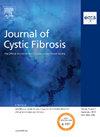WS02.04Perspectives on inhaled therapy in the post-CFTR modulator era: a survey of adults with cystic fibrosis
IF 5.4
2区 医学
Q1 RESPIRATORY SYSTEM
引用次数: 0
Abstract
Objectives
The transformative effects of CFTR modulators (CFTRm) have led adults with cystic fibrosis (awCF) and clinicians to re-evaluate the role of inhaled therapy. Our objective was to understand the perspectives of awCF.
Methods
A survey was shared via two CF-specific UK mailing lists and social media. Participants rated the importance of inhaled therapy from 0 (least) to 100 (most) and noted any changes since starting CFTRm. Free-text responses were categorised into insight-generating themes.
Results
Responses were received from 414 people with CF, of which 224 (54%) identified as female. Responders represented 17/26 UK adult CF centres (range 1-35 per centre). The majority were prescribed CFTRm (n=344, 83.1%) and/or inhaled therapy (n=321, 77.5%). Overall, the perceived importance of inhaled therapy was significantly lower among those on CFTRm, median of 72/100 (IQR: 48.0) compared to 88 (IQR: 45.3), p = 0.03. Among those prescribed CFTRm, 138 (40.1%) regarded inhaled therapy as less important than prior to CFTRm. This perspective was attributed to a reduction in symptoms, a lack of perceived benefit from inhaled therapy, and a desire to decrease treatment burden. Several considered inhaled therapy more appropriate for acute illness rather than routine maintenance. Conversely, 172 (50%) considered inhaled therapy equally or more important than before CFTRm. Their rationale included an awareness of cumulative lung damage, clinician recommendations, a discernible benefit from inhaled therapy, and the belief that it helps sustain the benefits of CFTRm into later life.
Conclusions
The impact of CFTRm on perspectives regarding inhaled therapy is variable amongst the awCF in the UK. Whilst population-level evidence regarding the clinical impact of changing inhaled therapy regimens for awCF taking CFTRm is awaited, clinicians should be aware of the variation in patient perspective during the process of shared decision-making and individualisation of care.
后cftr调节剂时代的吸入治疗展望:对囊性纤维化成人的调查
CFTR调节剂(CFTRm)的变革性作用已导致成人囊性纤维化(awCF)患者和临床医生重新评估吸入治疗的作用。我们的目标是了解awCF的视角。方法通过两个cf特定的英国邮件列表和社交媒体分享调查结果。参与者将吸入治疗的重要性从0(最少)到100(最多)进行评分,并记录自开始CFTRm以来的任何变化。自由文本回答被归类为产生洞察力的主题。结果共收到414例CF患者的回复,其中224例(54%)为女性。应答者代表17/26个英国成人CF中心(每个中心范围1-35个)。大多数患者使用CFTRm (n=344, 83.1%)和/或吸入治疗(n=321, 77.5%)。总体而言,在CFTRm患者中,吸入治疗的感知重要性显著降低,中位数为72/100 (IQR: 48.0),而中位数为88 (IQR: 45.3), p = 0.03。在服用CFTRm的患者中,138人(40.1%)认为吸入治疗的重要性低于CFTRm前。这一观点归因于症状减轻,吸入治疗缺乏明显的益处,以及减轻治疗负担的愿望。一些人认为吸入治疗比常规治疗更适合急性疾病。相反,172人(50%)认为吸入治疗与CFTRm前同等或更重要。他们的理由包括对累积肺损伤的认识,临床医生的建议,吸入治疗的明显益处,以及相信它有助于将CFTRm的益处维持到以后的生活。结论:CFTRm对英国awCF患者吸入治疗观点的影响是不同的。虽然关于改变吸入治疗方案对服用CFTRm的awCF的临床影响的人群水平证据尚待确定,但临床医生应该意识到在共同决策和个性化护理过程中患者观点的变化。
本文章由计算机程序翻译,如有差异,请以英文原文为准。
求助全文
约1分钟内获得全文
求助全文
来源期刊

Journal of Cystic Fibrosis
医学-呼吸系统
CiteScore
10.10
自引率
13.50%
发文量
1361
审稿时长
50 days
期刊介绍:
The Journal of Cystic Fibrosis is the official journal of the European Cystic Fibrosis Society. The journal is devoted to promoting the research and treatment of cystic fibrosis. To this end the journal publishes original scientific articles, editorials, case reports, short communications and other information relevant to cystic fibrosis. The journal also publishes news and articles concerning the activities and policies of the ECFS as well as those of other societies related the ECFS.
 求助内容:
求助内容: 应助结果提醒方式:
应助结果提醒方式:


